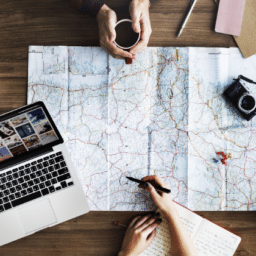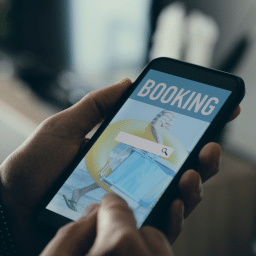In today’s dynamic world, business travel remains essential to success, but navigating unfamiliar settings and technologies can pose security risks. For the modern business traveller, protecting both personal and company data on the go is more than just good practice—it’s crucial to a secure, productive trip.
Read on to learn what cybersecurity means, the types of security threats every business traveller should be aware of, and essential tips for safeguarding your data on the go.
What is data protection?
Data protection for business travellers requires heightened attention, as it involves defending against online threats like phishing, social engineering, and malware, which are often intensified outside the secure networks of an office. Cybercriminals frequently target business travellers by seeking to access company systems, networks, and devices in hopes of obtaining sensitive information.
While travelling, threats to data security can emerge through connections to unsecured Wi-Fi networks, the use of public devices, or even charging stations. To protect valuable business and personal data, it’s essential to implement security best practices, ensuring that both company and client information remains safe while on the move.
Recognising the risks of common security threats
Business travellers are prime targets for cybercriminals who capitalise on vulnerabilities in both technology and human behaviour. Here are key security threats to watch for:
1. Phishing attacks and malware
Cybercriminals commonly use deceptive emails or messages to prompt unsuspecting users into clicking harmful links or sharing sensitive data. These tactics can lead to malware infections, which allow attackers to monitor your activity, steal information, or even control your device. Vigilance and scepticism with unknown messages can be your best defence.
2. Unsecured Wi-Fi connections

3. Lost or Stolen Devices
Losing a device containing confidential information poses a significant risk. Safeguard your data by using secure passwords, enabling device tracking, and employing data encryption to keep information safe in case of loss or theft.
By understanding these risks and proactively managing your security, you can help prevent data breaches and maintain control over your digital footprint while travelling.
Tips to safeguard your data while travelling for business
1. Secure your device and protect your accounts
Before heading out, take proactive steps to secure each device—whether it’s a phone, laptop, or tablet. Start by setting strong passwords, unique PIN codes, or even better, using biometric authentication like fingerprint or face ID, which can make unauthorised access much harder.
Activate device encryption features to safeguard your data and consider encrypted messaging apps for private conversations. Use unique passwords across different accounts to minimise the fallout if one account gets compromised. Biometric methods also prevent password theft from “shoulder surfing,” where someone watches as you enter your credentials.
And remember: your password is personal. Keep it to yourself, change it periodically, and think of it as an essential security layer that keeps your sensitive information safe.
2. Connect safely to secure networks
When travelling, it’s crucial to steer clear of public Wi-Fi networks found in airports, cafes, and hotels—especially when handling sensitive tasks like banking. Instead, opt for a secure, trusted connection. This could be your mobile data or a Virtual Private Network (VPN) that encrypts your internet traffic, providing an added layer of security.
Before entering any sensitive information, check that the websites you’re using for banking, or payments are secure. Look for HTTPS encryption, which is indicated by a padlock icon in the browser’s address bar, ensuring your data is transmitted securely.
Remember to always log out of your accounts when you’re done to prevent session hijacking. Be cautious about sharing passwords or PINs, and only do so in trusted environments. Stay vigilant against social engineering tactics, where cybercriminals may manipulate you into revealing your information.
3. Be mindful of social media sharing
When you’re travelling, it’s important to exercise caution with what you share on social media. Limit the personal details you disclose and avoid posting real-time updates about your location and itinerary. Cybercriminals can exploit this information to target you for theft or surveillance, making it safer to wait until you return home to share your travel experiences.
To enhance your social media security, take a moment to review your privacy settings and ensure your profiles are private. This gives you greater control over who can access your accounts and posts, reducing the risk of unwanted attention. Additionally, remember that features like Stories on Instagram or Snapchat don’t vanish as easily as many believe. While they may disappear after 24 hours, the content could still be accessible by those who are determined.

Be aware that photos can contain metadata, which may reveal your location. This is particularly concerning if someone gains access to your images, as they could determine that your home is unoccupied. To mitigate this risk, consider sharing photos only after you’ve returned home.
4. Exercise caution with Wi-Fi and Bluetooth
While staying connected during business travel is essential, using Wi-Fi can pose significant risks, particularly regarding sensitive company and client information. To safeguard your data, avoid public networks that are not password-protected. If connecting to a public Wi-Fi is unavoidable, always verify the official network name and password with the staff.
In addition to cautious Wi-Fi usage, it’s wise to manage your device’s Bluetooth settings. Disable Wi-Fi and Bluetooth when not in use, as this prevents unauthorised access to your device.
By turning off automatic connections to available networks and Bluetooth devices, you minimise the risk of cybercriminals exploiting these features to steal your information. Remember, a few simple precautions can significantly enhance your security while travelling.
5. Back up your data to the cloud
Before setting off on your business trip, it’s essential to back up all your device’s data to the cloud. This proactive measure not only safeguards your information but also ensures it remains accessible in the event of a lost device or any technical hiccups during your travels.
Storing your data on a remote server allows you to retrieve it from any device and location, making it easy to continue your work no matter where you are. This is particularly important for maintaining productivity, as it facilitates seamless collaboration with your colleagues. Imagine needing to share a crucial presentation or access vital documents while you’re away; cloud backups empower you to do just that without missing a beat.
Additionally, many cloud services offer built-in security features, such as encryption, to further protect your sensitive information. Incorporating cloud backups into your travel routine is a small but significant step towards ensuring your data security while on the go.
6. Prioritise operating system updates
Keeping your operating systems current is essential for protecting your devices from the latest cyber threats. Each update is crafted to address security vulnerabilities that hackers could exploit, making it a critical part of your digital defence strategy. Regularly checking for and installing updates ensures that you have the latest security features and protections against potential viruses.
In addition to your operating systems, remember to update your mobile apps, particularly those you rely on during business trips. Outdated applications can contain security gaps that put your sensitive data at risk. By maintaining up-to-date software, you not only enhance your devices’ functionality but also fortify your security posture.
Incorporating this simple habit into your routine can significantly mitigate risks and ensure a smoother business travel experience.
7. Take data precautions
When travelling for business, it’s wise to take data security seriously. Start by packing essential devices and storing only the information you will need for your trip. This strategy not only minimises the risk of cyber-attacks but also helps to protect against physical theft. By reducing the amount of sensitive data in your possession, you can significantly lessen the potential impact of a security breach.
Consider checking with your company’s IT department about the possibility of borrowing clean devices that have no stored data, specifically for your travels. This practice can greatly enhance your security by ensuring that only the necessary information is at risk, thereby safeguarding your company’s confidential data. Don’t forget to familiarise yourself with your organisation’s travel policy or speak with your manager to see if this option is available.
By following these precautions, you can maintain a more secure travel experience and ensure that your data remains protected.
8. Conduct a post-trip security review
After returning from your business trip, it’s crucial to perform a post-trip checkup on your devices. Schedule a visit with your IT department to ensure everything is functioning properly and to confirm that your devices haven’t been compromised by malware or other cyber threats during your travels.
If any issues are detected, the IT team will be well-equipped to take appropriate measures to mitigate any potential damage to your company and its clients.

Keeping data secure while travelling for business
In the realm of business travel, safeguarding sensitive data is paramount. While a traveller’s personal photos might not raise an eyebrow, leaving a work laptop unattended could spell disaster. Compromised company data can lead to significant consequences, affecting everything from legal standing to public relations.
To mitigate these risks, it’s vital to establish clear guidelines for handling sensitive information during business trips. Communicating these protocols through your corporate travel management plan ensures that all employees are aligned on best practices.
Holiday Tours’ commitment to data protection

WE’RE HERE TO TAKE THE HASSLE OUT OF BUSINESS TRAVEL
REACH OUT TO US AT +603 6286 6288 OR [email protected]
















